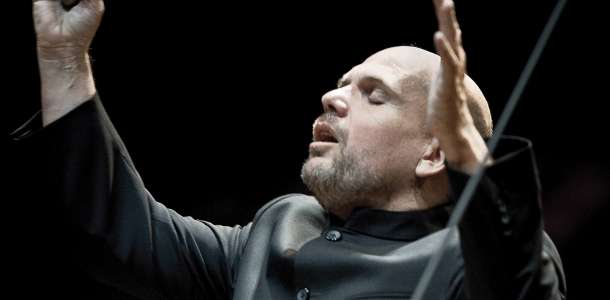|
Back
The Titan of the Orchestra New York
Avery Fisher Hall, Lincoln Center
04/12/2012 - & April 13, 14, 17, 2012
Sergei Prokofiev Piano Concerto No. 3 in C Major, opus 26
Gustav Mahler: Symphony No. 1
Yuja Wang (Pianist)
New York Philharmonic Orchestra, Jaap van Zweden (Conductor)

J. van Zweden (© Hans van der Woerd)
How easy it would be to start this review with a picture and a blazing review of Yuja Wang and the Prokofiev Third Piano Concerto. That was until Fate intervened in the person of a young Dutch conductor.
Because Jaap van Zweden conducted Mahler’s First Symphony. And all the praise I expected and obtained from Yuja Wang evaporated in the mists of the Mahler performance.
Mr. van Zweden, once the youngest concertmaster of the Royal Concertgebouw Orchestra, has swept across Europe, landed in Dallas (where he is Musical Director) and next year will take the challenging helm of an orchestra with which I was well acquainted for many years, the Hong Kong Symphony. But last night–and for three further evenings–he will have plunged the New York Philharmonic into the glories of the Mahler.
That is hardly easy with the so-called “Titan” symphony. Anyone who sweats with “Mahleria” knows it can be elegiac or lyrical or majestic or even–in the third movement–quite funny with the village klezmer band interrupting a funeral.
If one had to characterize the van Zweden performance, it would be “bracing”. Nothing was Grieg-pretty-pretty with the sunrise. After the six-part harmonics of the opening, those bird-calls meant business Mahler’s morning was not quite primeval, but the sounds came from every part of the stage, a series of wake-up calls.
That was the mood of the following dances, which were actually danceable (in a metaphorical sense). The illusion was that Mr. van Zweden was taking the pace quicker than usual. The reality was that the rhythms were sharp, his upbeats gave every note its adrenaline.
Of course the challenge is “how Jewish” do you want that funeral march band to sound? I’ve heard the klezmer so refined and clever (the Boulez recording which I long ago threw out), that it was dehumanizing. Another time, the Taiwan Symphony came to Hong Kong, and it was such bad playing that they almost parodied the parody.
Mr. van Zweden decided that this funeral should start lugubriously. Why have one double-bass play the “Frère Jacques” tune, when four New York Phil double basses could play it? And why accent the Jewish band, when a tenuous droopiness, a slightly inebriated group of winds shnapps?) would do the trick. Whatever it was, the string choir at the end of the movement was an elegant contrast.
The finale was controlled fire. I have heard more passionate endings, more endings which retained the dissonance of the first chord. But Mr. van Zweden’s fire never seared: it was blazing, it was tense, and the recapitulations of earlier themes were swirled around like dreams before Mahler’s own twilight of the gods.
Every Mahler is memorable. This was a very very great Mahler performance, and New Yorkers have three more chances to hear it.

Y. Wang (© Holger Hage/Yuja Wang)
Back to Ms. Wang. That is hardly difficult, for in her last three performances in New York, she showed a startling persona. Whatever her Chinese training gave her in precise electrifying technique–all so necessary for the Prokofiev Third Concerto–her further training in Canada and with Gary Graffman, has given her understanding and personality.
Obviously it was the technique in this whizz-bang concerto which had to stand out. But in the few more meditative passages–the Andante movement in the variations and the warm sections of the finale–she retained that tension, overlaying it was that so human personality that is her hallmark.
Harry Rolnick
|